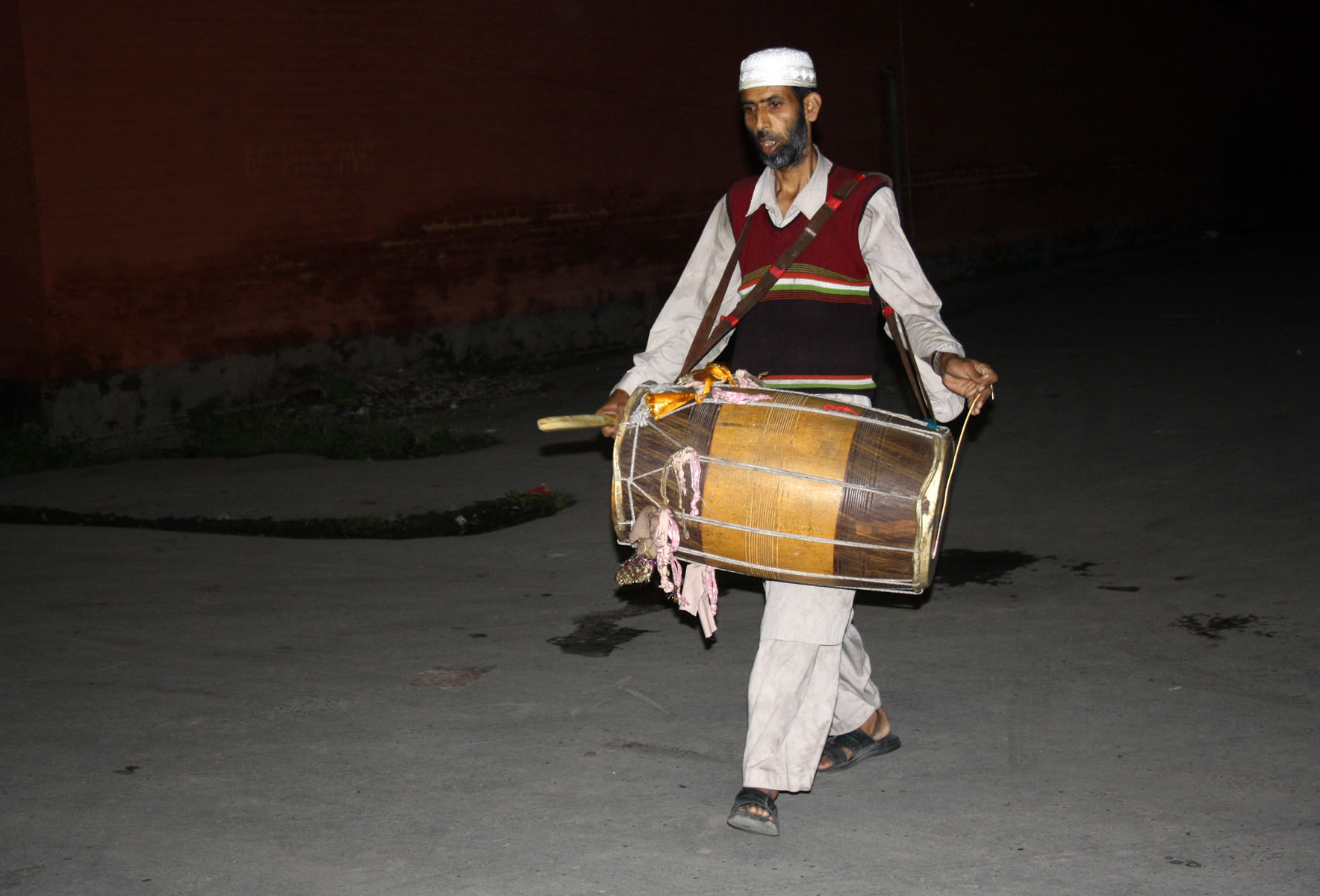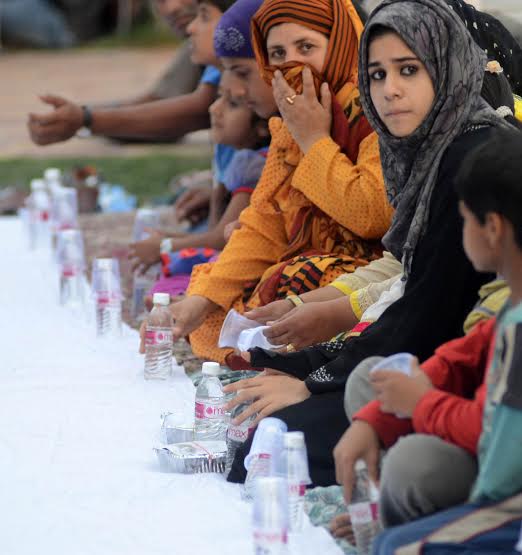Unlike 2020 when pandemic restrictions confined people to their homes during Ramzan, it is business as usual this month. With precautions in vogue, the people are praying and purchased normally. Amid this spiritual resurgence, however, many are pondering over why this devoutness outlasts the holy month only, reports Yawar Hussain

During the last Wednesday night when Kashmir was into a deep slumber, the sounds of traditional drummer (Sahar Khan) pierced through the ears of Hanief Ahmad, 31. It took him some time to understand the occasion but found it difficult to wake up. He didn’t offer mandatory Fajr prayers.
Ahmad like many others in Kashmir is adjusting to the new schedule. He does not want to miss the blessed month.
Asked about how he feels Ramzan is different from other months of the year, Ahmad says that his mind is filled with thoughts of being more “practising Muslim” (in this month) than he is in other months of the year.
Ramzan, the ninth month of the Islamic lunar calendar began with the sighting of the crescent, which, in Kashmir, was on April 14.
One of the five pillars of Islam, fasting is an integral part of life in Ramzan the world over. Muslims believe that the reward of every good deed is multiplied during this month, so Ramzan is also a time for prayer, charity, reflection and abstaining from bad thoughts and deeds.
The piety isn’t confined just to a specific person or area but is witnessed across Kashmir with more and more people filling up mosques for daily and special Taraweeh prayers.
The month sees religiosity at the peak within the mosques, homes and the streets. It is the month of charity the world over. For most of the month, the eateries stay closed.

The Imams Say
Abdul Majeed Awan who is an Imam at a mosque in Sonwar says people have been taking religion as something, which is “forced” on them rather than something they should grow up loving.
“I know the majority of people behind me would vanish by the Zuhr prayers on the day of Eid,” Awan said. “Also, it isn’t just the youngsters who stop coming to offer prayers after Ramzan but a vast majority of elderly people as well.” He believes people think that managing the month of fasting better will help them sail through.
Seconding Awan’s views, Dr Mansoor Ahmad, a dental surgeon, and an Imam himself says the people see practising religion during Ramzan as something binding on them.
“They take it casually afterward. We miss the real point behind Ramzan,” Dr Ahmad said. “It is basically a month to change the lives of people so that they become practising and pious Muslims rather than just fasting and practising during the month.”
He said people in Kashmir approach Ramzan with the intention that whatever “bad” deed they are avoiding will be done after the month.
“For example, a smoker resolves that in Ramzan he will quit smoking and ensure Namaz but he will resume smoking after Eid and give up the Namaz,” he says.
“From childhood, we are being forcefully put into a frame of religion which nobody adheres to in the longer run,” Syed Shahid Rashid, an Islamic Studies research scholar who teaches law said. “We are conditioned in a way where private and public life is separated which leads us to believe that we have to practice the religion just in the private space.”
A doctor, a journalist and even a lawyer or anyone else, Rashid says, needs to take his work as a practice in consonance with Islam. “Everybody doesn’t need to specialize in religion. But the monopoly of clergy leads other people to believe that they need to learn the religion from them only,” he insisted, adding that this is one of the reasons that people don’t practice religion after Ramzan.
Sudden Piety
The three main things which dominate the Ramzan and then disappear by and large are prayers, different varieties of cuisines along charity. The mosques, unlike last year’s closure due to Covid-19 induced lockdown, are again reverberating with prayers.
After the pre-drawn Sehri meal, the silence is broken by the call for the Fajr prayer which on other days is mostly not heard by the people who are sleeping.
Sharing his experience of the morning prayers, Nadeem Bazaz, who lives in uptown Srinagar says he also finds it difficult to get up early.
“But there is something divine which makes us all practice the Islam like we should be doing right through the year,” Bazaz says, adding that he fails to understand why he along with many others don’t offer the noon prayers (Zuhr) on the day of Eid-ul-Fitr which marks the culmination of the month of Ramzan.
For Mudabir Ahsan, who works at a private bank, the noisy and energetic environment of the usual days is replaced by peaceful customers and colleagues. “If anyone creates a disturbance at work then the others urge the observance of calm as it is Ramzan”.
She says that citing Ramzan makes people engage in responsible behaviour. “Everyone says that it is Ramzan and you are making us wait. Or how can you overcharge during Ramzan? Or I do not want to fight, it’s Ramzan.”
She, however, says that everything changes as the month of fasting end with people going back to being who they were before the month started.
“It is a very different psyche in people. We believe that we have to be at our best during this holy month only.
What The Beggars Say
Since charity is an integral part of this month, the destitute often come knocking at houses across Kashmir, seeking help. Zakat and Sadaqah are two forms of charity that are obligatory for all Muslims. Zakat, a pillar of Islam, is a fixed percentage of total wealth that a person of means needs to give to the poor, while Sadaqah is a voluntary charity.
Charity activity peaks on Shab-i-Qadr, which is held on one of the odd-numbered nights (according to the Ramzan calendar) during the last 10 days of the holy month. Mosques are brightly lit and packed with visitors for night-long prayers. It is believed that the first verses of the Holy Quran were revealed to the Prophet on this night. Nowadays, Shab-i-Qadr is usually held on the 27th night of Ramzan.
A group of beggars outside the Syed Yaqoob Sahab shrine in Sonwar, Srinagar said that people’s behaviour towards them changes radically in the month.
“People, otherwise ignoring us suddenly start to acknowledge our existence,” the group said. “On normal days we have to invoke God but in Ramzan, the people look for us and ensure to give alms to us”.
Waleed Ahmad (name changed), who was giving alms to the poor at the Sonwar shrine says he usually gives away what he has to on Friday’s but in Ramzan, the charity is rewarded more.
“God himself has doubled, many times over, the benefits of every good deed in this month. It is in itself special. That is why so many people are visibly doing it. Otherwise, Kashmiri people give away more than others,” he said.
Reacting to the comments of the group of beggars, Ahmad said: “There are fewer people sleeping on the roads in Kashmir than other parts of the world.”
It is this month that most of the charitable organisations manage most of their yearly budgets. In certain cases, the people visit them with donations because they understand the value of offering their donations to these groups. These social groups have been the key element in managing the destitution caused by weather conditions, poverty or the situation. These groups have been on the frontline in managing the Covid-19 and its impact. Some of them even supply Oxygen and machines to the needy.
Sumptuous Ramzan Meals
With a fasting time of over 14 hours, the Kashmiri people aren’t just ensuring that the poor have enough to feed themselves but they also make sure that they have extra stuff to eat at the time of Iftar, the evening meal with which the fast is broken.
The common attractions are local delicacies such as Babribyol tresh (a drink made of basil seeds), firi’en (made of semolina and milk), qateer (a drink of tragacanth), custards, fruit juices, dates and dishes made with mutton and chicken.
Sajad Dar, a local grocery store owner in Jawahar Nagar says that the sales increase prior to the beginning of Ramzan as people for no specific reason start to hoard things in advance.
“People come less to my shop for various normal items because in Ramzan they kind of buy it in bulk. They then come for dates, basil seeds, juices and various other items which normally we don’t sell,” he says.
He says in the midst of Ramzan the sales are back to normal but then increase again when Eid approaches.
Another business that witnesses a beeline of customers in Kashmir is that of the bakery. People start queuing up outside the shops of the Kandur (baker). The Kandur take special orders – so visitors can get customized bread made with extra ghee, poppy and sesame seeds.
Meanwhile, the street food vendors, who are conspicuously absent in the day, line the markets in the evening to offer food to passersby. Those stuck in transit at iftar time can rest assured that co-passengers or passersby will offer them dates or fruit so that they can symbolically break their fast.
Some mosques and shrines also spreadsheets and layout an iftaar meal – typically including a plate of fruits, dates and something to drink.
Muzaffar Ahmad Malik, a resident of Sanat Nagar, buying eatables at a famous departmental store in the area says that spending during the month is advised in Islam.
“We need to save and spend in this month. Spending doesn’t mean on our own selves but also on others. It is a month to celebrate the triumph over Shaitan (devil) and the practices which we indulge in under his influence throughout the year,” he says, adding that the human body needs better nutrition during the month which is balanced.
Vanishing Covid-19 Fear
With schools and colleges closed till April 30 owing to the resurgence of the Covid-19 pandemic, the mosques this year, unlike 2020, are full of people offering not just the five-time mandatory prayers but also the Taraweeh prayers.
The fear of last year among the people, when all the religious places were shut due to Covid-19 lockdown, has also vanished.
Nazir Ahmad Zargar, an octogenarian resident of Padshahi Bagh says that the chances of contracting Covid-19 is at every place including the fully open tourist centres, hotels, parks and government offices.
“Why going to a Masjid would make me vulnerable and not the other places. The shops are open which are very congested,” he says adding that the fear among the people has reduced drastically since last year.
He says the Covid-19 SOPs are being practised in mosques like they are at other places.
“The government should understand that the Covid-19 is going to be here with us. We can’t fear it and stop offering prayers.”
Mohammad Yaseen, a septuagenarian and also the resident of Padshahi Bagh is an excited man because the mosques this year are open in Ramzan.
“I have been visiting our local mosques regularly for the past three decades now even when the situation in Kashmir was tumultuous. But last year, I had to sit home. I was dejected. But thanks to God we have resumed prayers,” he says.















